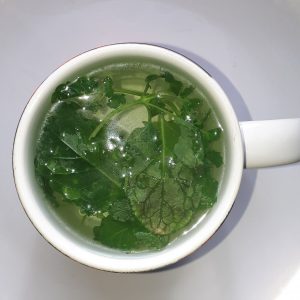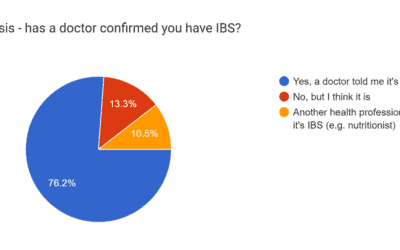The benefits of herb tea
- If you have diarrhoea predominant IBS (IBS-D) then you need to keep up your water intake
- If you’re more prone to constipation then you need to keep up your liquid intake to stop stools getting too hard.
Do you want to know whether coffee is good for IBS? Read more about how coffee can affect your digestion.
So what’s the deal with herb teas for IBS?
Best herb teas for IBS
- Warm tea can help you stomach relax and comfort you during a flare up.
- Teas can be cooled and kept in the fridge if you prefer colder drinks.

Peppermint tea reduces gas
Peppermint oil is an antispasmodic so can support relaxing painful stomach cramps, and is most effective in capsules, but the tea can be very helpful.
Its been traditionally used as a digestion aid in cultures around the world at the end of meals. Peppermint tea will relax the sphincter at the top of the stomach, increasing your burping, so the gas doesn’t travel down the digestive system.
This is one reason why it’s best not to drink mint tea before bed, especially if you are prone to reflux.
Does ginger help IBS?

Fennel may relax IBS cramps
Grow your own IBS tea

Hi I'm Anna Mapson, registered Nutritional Therapist.
I help people with IBS and SIBO get control of unpredictable gut symptoms to find long term relief from painful and embarrassing IBS without restrictive dieting.
I can help you to:
- understand your digestion better, so you recognise your triggers
- eat a well balanced diet, with tasty meals that are simple to prepare
- develop better digestion and more energy
Find more about my 3 month 1:1 Gut Reset programme
IBS and Coeliac Disease: A Guide to Understanding & Diagnosis
Are you confused about IBS and coeliac disease? Maybe you feel better without gluten in your diet, but you're not sure whether you've been tested for coeliac disease or not. The cross over between IBS and coeliac disease 1 in 4 people are misdiagnosed with IBS when...
The impact of IBS on daily life
The struggles of IBS: A new survey reveals the profound impact on daily life. I ran a survey with my audience about the impact of IBS, and the way Irritable Bowel Syndrome (IBS) affects your day-to-day lives is really clear. I already knew from my work with clients...
Taking amitriptyline for IBS
Have you been offered a low dose of amitriptyline for IBS? It's a antidepressant that's sometimes offered to patients who experience significant abdominal pain related to digestion. If you're unsure about taking medication for your IBS, you're not alone. I hear this...





I just looked chamomile tea up on the Monash app and it is definitely not ok.
You’re absolutely right, but not everyone with IBS needs to avoid FODMAPS so this tea might help some people. 🙂